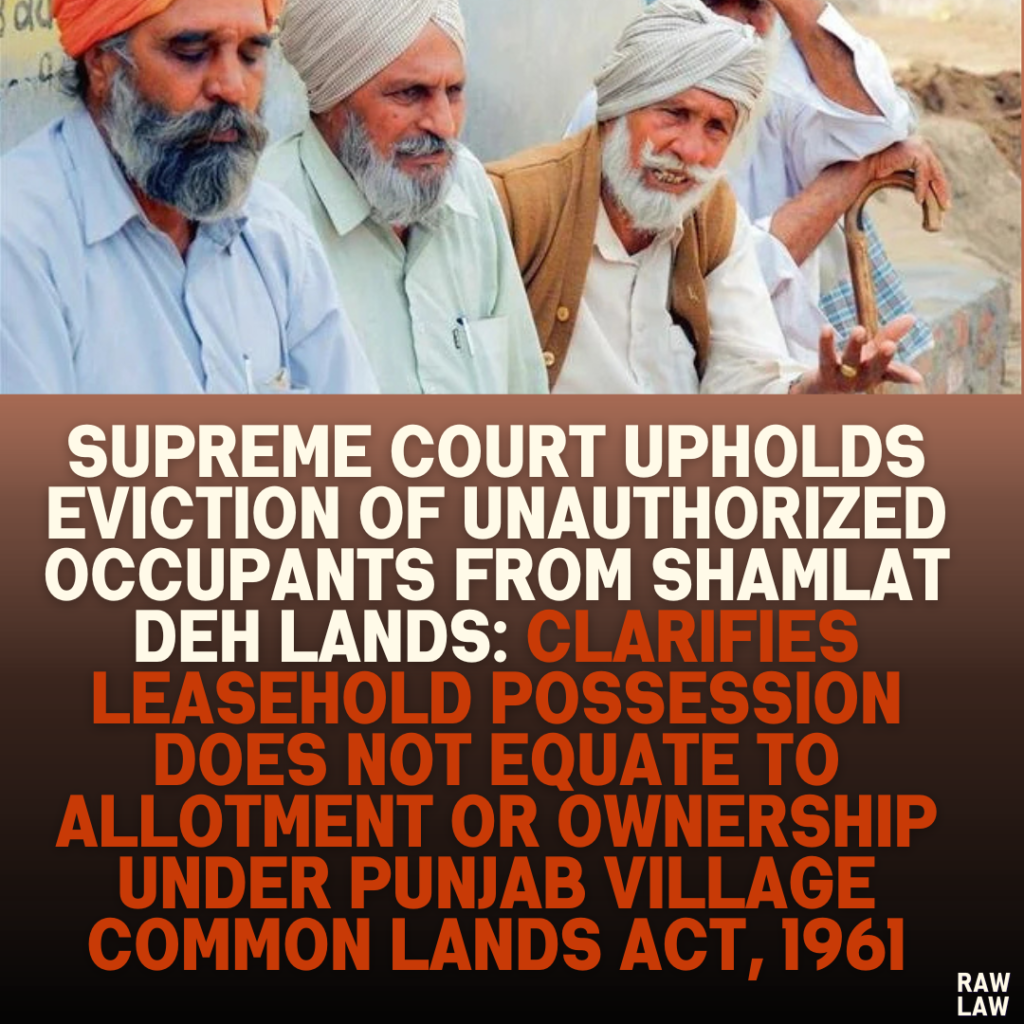Court’s Decision
The Supreme Court dismissed multiple Special Leave Petitions (SLPs) seeking protection under the amended Section 2(g)(ii-a) of the Punjab Village Common Lands (Regulation) Act, 1961. The Court ruled that the petitioners, who were unauthorized occupants of “Shamlat Deh” lands, could not claim ownership or protection. It emphasized that leasehold possession does not equate to quasi-permanent allotment or transfer under the Act.
Facts
The cases involved disputes over lands classified as “Shamlat Deh,” a term referring to village common lands. Petitioners asserted that these lands were either:
- Allotted to their predecessors on a quasi-permanent basis, or
- Transferred through other means entitling them to ownership or statutory protection.
Key facts included:
- Petitioners or their predecessors occupied the lands under lease agreements.
- After lease expiration, the petitioners continued possession without paying rent or handing over the lands.
- The Punjab and Haryana High Court and lower authorities had ruled that these lands vested with the Gram Panchayat and ordered evictions.
Issues
- Did the petitioners’ claims qualify for protection under the amended Section 2(g)(ii-a) of the Act?
- Is leasehold possession equivalent to allotment or transfer under the Act?
- Do the lands in question legally vest with the Gram Panchayat as “Shamlat Deh”?
Petitioner’s Arguments
- The lands were allotted or transferred to their predecessors, making them eligible for protection under the amended Section 2(g)(ii-a) of the Act.
- Significant improvements were made on the lands, bolstering their claim of ownership.
- The lands were evacuee properties initially vested in the predecessors under quasi-permanent allotments.
- The petitioners argued that the authorities erred in concluding the lands were “Shamlat Deh.”
Respondent’s Arguments
- The lands were classified as “Shamlat Deh” and vested with the Gram Panchayat under the Act.
- Petitioners were mere lessees who continued possession after lease expiry, making them unauthorized occupants.
- There was no documentary evidence to support claims of allotment, transfer, or quasi-permanent status.
- The Panchayat sought eviction under Section 7 of the Act.
Analysis of the Law
1. Section 2(g)(ii-a) of the Act
The amendment protects lands that:
- Were allotted on a quasi-permanent basis to displaced persons, or
- Were transferred to any person by sale or other means on or before July 9, 1985.
The Court held:
- Leasehold rights are temporary and do not constitute a transfer or allotment.
- Petitioners failed to establish their claims under the amendment.
2. Precedent Analysis
The Court relied on prior judgments:
- Amar Singh v. Custodian (1957):
- Distinguished between “lease” (temporary rights) and “allotment” (temporary occupation without lease characteristics).
- Basant Ram v. Union of India (1962):
- Clarified that quasi-permanent allotments were valid only as long as the Custodian retained control over the land.
- Bakshish Singh v. State of Punjab (2011):
- Confirmed that leasehold rights do not amount to ownership or allotment.
The Court emphasized that none of the petitioners could prove their claims met the conditions outlined in these precedents.
Court’s Reasoning
- Lease and Allotment Are Distinct:
- A lease is a temporary arrangement defined under Section 105 of the Transfer of Property Act, 1882.
- Quasi-permanent allotments or transfers involve more permanent or ownership-like rights.
- Failure to Prove Claims:
- Petitioners did not provide evidence of quasi-permanent allotments, sales, or transfers of ownership.
- Revenue records (Jamabandis) consistently identified the lands as “Shamlat Deh” and owned by the Panchayat.
- Unauthorized Occupation:
- Post-lease expiration, petitioners continued possession without paying rent, rendering them unauthorized occupants.
- Petitioners’ arguments of adverse possession and improvements were rejected.
- Legislative Intent:
- The amended Section 2(g)(ii-a) was designed to protect specific allotments and transfers, not unauthorized occupation post-lease.
Conclusion
The Supreme Court dismissed all SLPs. It upheld the eviction orders and reaffirmed the Panchayat’s ownership of “Shamlat Deh” lands. The Court observed:
- “A lessee cannot challenge the title or ownership of the Panchayat from which the lease was derived.”
- Leaseholders have no protection under the amended Act if they fail to demonstrate quasi-permanent allotments or lawful transfers.
Implications
- Panchayat Ownership Strengthened:
- The ruling reinforces the rights of Gram Panchayats over village common lands.
- Prevents misuse of quasi-permanent allotment provisions.
- Clarifies Legislative Scope:
- Distinguishes between leases and allotments, limiting protections under Section 2(g)(ii-a).
- Discourages Unauthorized Possession:
- Unauthorized occupants cannot claim rights or statutory protection by overstaying leases.
